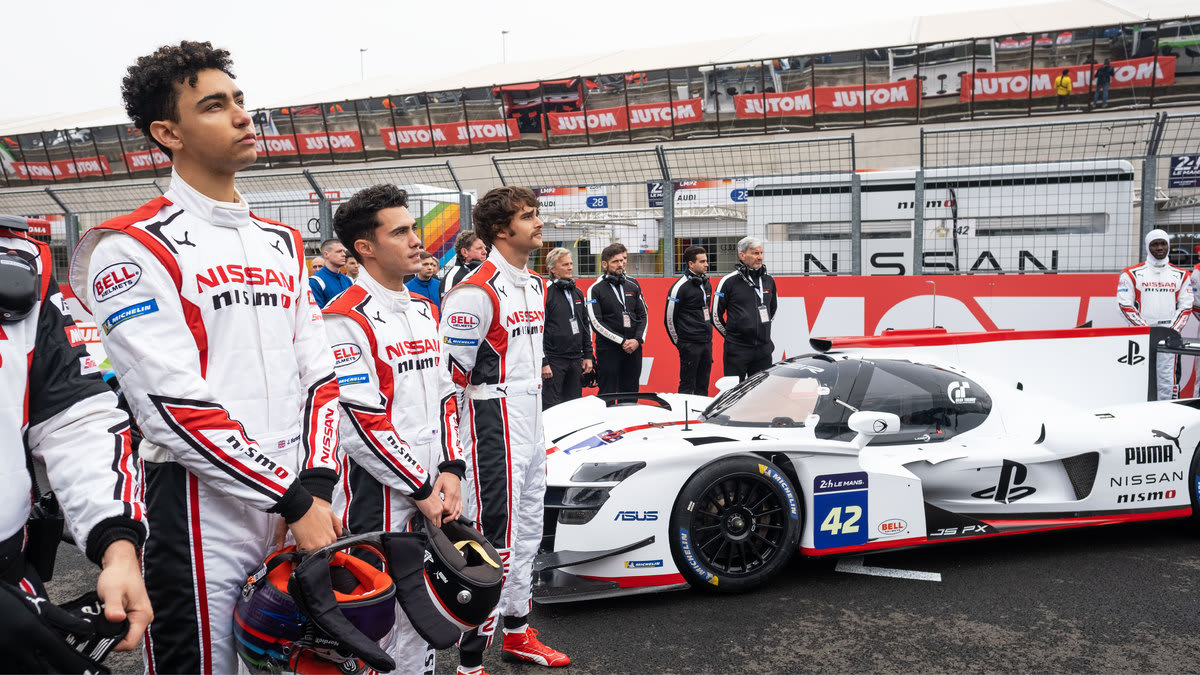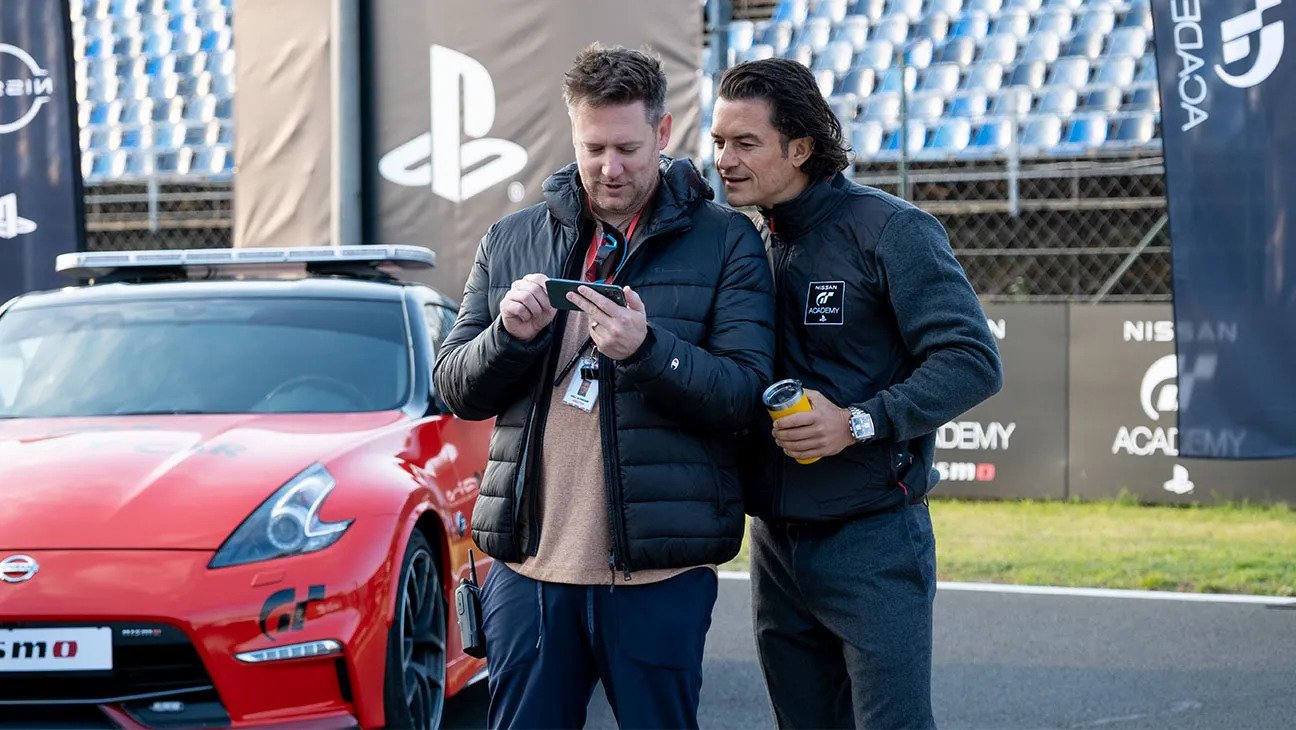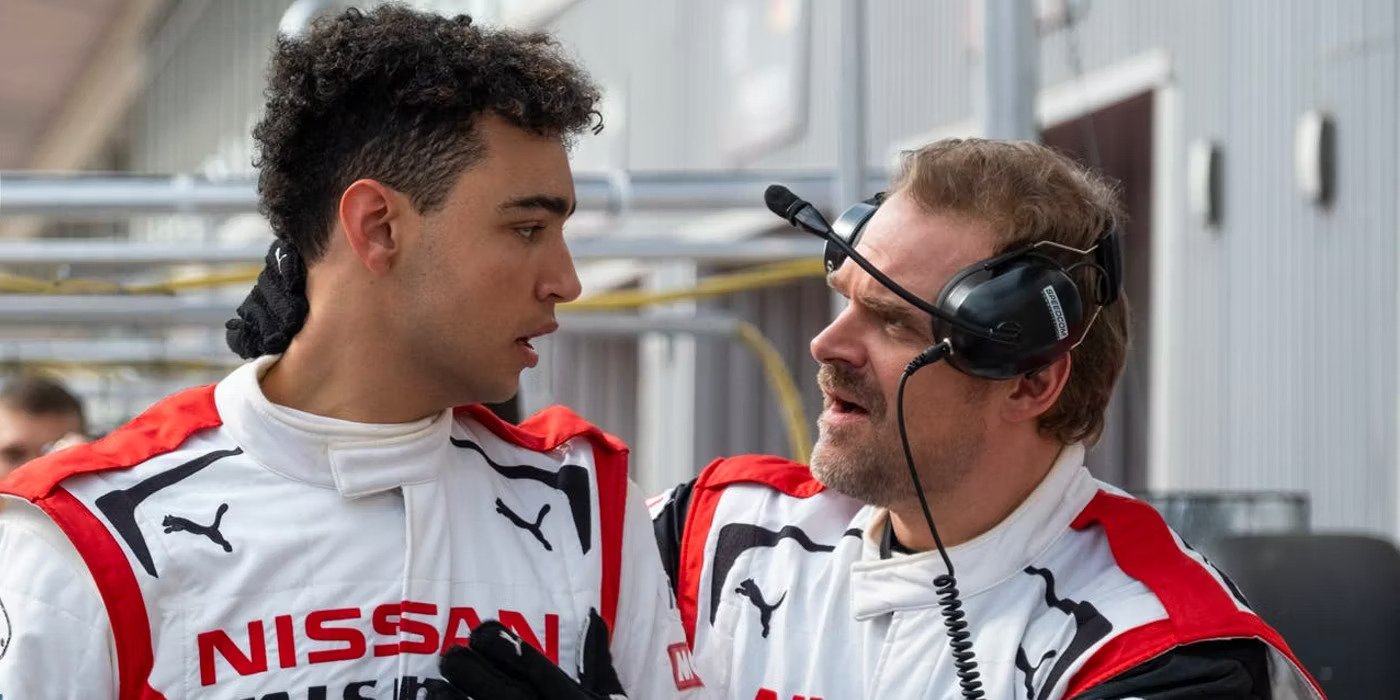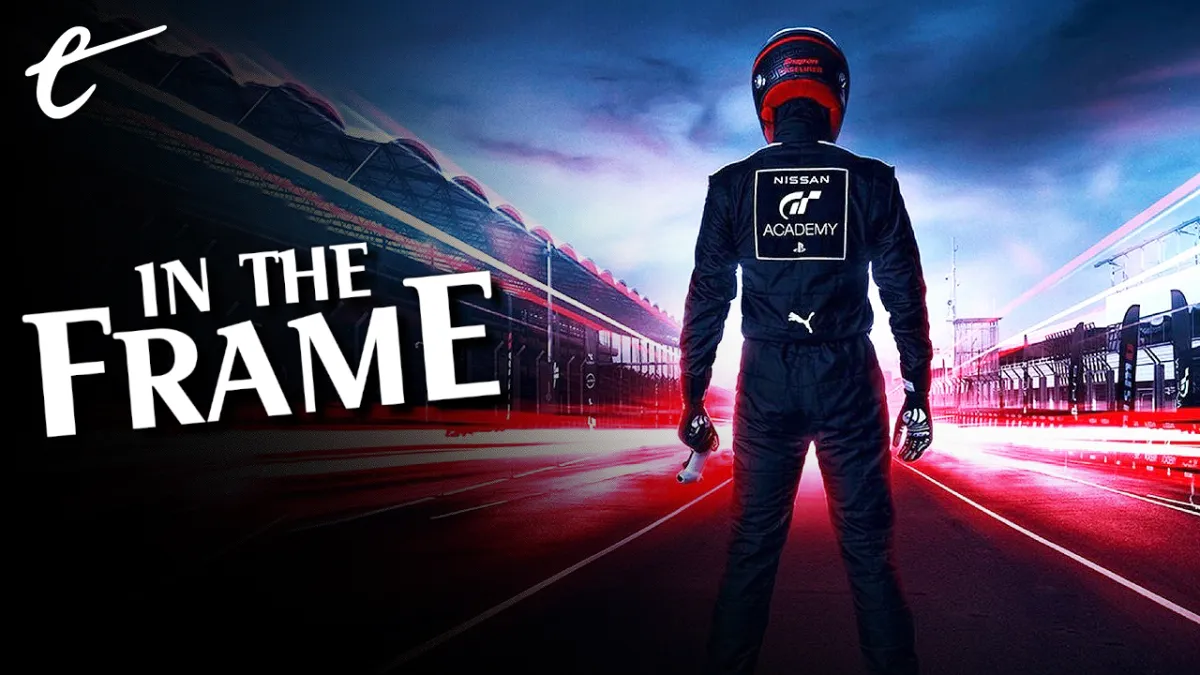Gran Turismo is the intersection of a number of interesting cinematic trends.
The most obvious is the resurgent video game adaptation. Hollywood’s insatiable hunger for intellectual property has reignited a passion for adapting that most challenging of forms into film and television. It has been a banner year for movies and shows based around video games. The Last of Us was a critical darling and ratings smash for HBO, and even performed well at the Emmys. The Super Mario Bros. Movie is the highest-grossing film of the year to date. Even Twisted Metal was dumb fun.
As such, Gran Turismo makes a certain amount of sense. It is an established video game franchise with a recognizable brand. However, Hollywood has always struggled to adapt video games that are relatively light on narrative and mythology. Racing games are particularly challenging, as demonstrated by Need for Speed. A straightforward adaptation of that sort of video game would be a difficult proposition, so Gran Turismo embraces a different genre: the corporate on-brand buy-o-pic.
This genre of capitalist hagiography has always existed, but it seems particularly prevalent this year. Movies like AIR, BlackBerry, Flamin’ Hot, The Beanie Bubble, Tetris and Pinball: The Man Who Saved the Game, not to mention upcoming releases like Unfrosted: The Pop-Tart Story, all belong to this particular prevalent mode of corporate mythmaking. Even Barbie, one of the year’s best films, fits in this trend. These stories might have human protagonists, but they are ultimately the success stories of particular products.
There’s a great deal of diversity in the quality and the tone of these stories. Movies like The Beanie Bubble and BlackBerry are decidedly cynical about their subjects, and everything that they represent. AIR isn’t under any illusions about the system that seeks to profit off the work of Michael Jordan (Damian Young), but argues that the real triumph is in Jordan getting compensated for that. Flamin’ Hot is an uncritical (and likely untrue) tale that argues for capitalism as a cure to systemic racism.
In case there’s any doubt where Gran Turismo belongs on that sliding scale that runs from reluctantly acknowledging to eagerly embracing corporate mythology, the film opens with an incredibly earnest and romantic account of the origins of the video game, presenting it as an ideal formulated by Kazunori Yamauchi (Takehiro Hira) to bring racing to the masses. From there, the film hands over to its driving force: Nissan marketing executive Danny Moore (Orlando Bloom).

For a movie based on a racing game, Gran Turismo is a surprisingly self-important work. In the sequence that establishes the plot of the movie, Moore travels to Tokyo to address the Nissan executives. As Moore tells it, the industry is in terminal decline. People aren’t buying cars anymore, especially younger generations. This is an existential threat to the companies that manufacture these cars, and Moore is willing to speak truth to power, to give these executives a rude awakening.
According to Moore, why aren’t these kids buying cars anymore? Is it because they have less disposable income? Is it just that a car is probably less of a priority to a young person who cannot afford their own house? Is it a result of more people using public transport? Is it due to environmental concerns, particularly for a generation that is more anxious about the threat of climate change? Clearly, it is a very complicated issue that demands a thoughtful solution.
Not according to Danny Moore. To Moore, the answer is video games. Kids play video games that allow them to drive cars, but the motor industry has failed to properly cultivate these “trainee consumers” by building a pipeline from these virtual racing machines to real-world automobiles. That is where Gran Turismo comes in. Moore proposes that Nissan train some young virtual drivers – “sim-racers” – with the goal of competing in actual real-life races. Brand synergy is the answer.
Gran Turismo is ostensibly based on the true story of Jann Mardenborough (Archie Madekwe), a graduate of “the GT Academy”, a program designed to turn these gamers into racers. Indeed, Mardenborough even does his own stunt-driving in the film. However, while the film focuses on Mardenborough and his family, including his father Steve (Djimon Hounsou) and his mother Leslie (Geri Halliwell), he’s really just a passenger along for the ride.
The film takes any number of liberties with the truth. In the movie, Mardenborough is the winner of the first GT Academy. In reality, he was one of two winners of the third annual competition. The film’s third act is built around Mardenborough’s triumphant race at the 24 Hours of Le Mans in June 2015. This is presented as the culmination of his career. In reality, it was the third time that he raced the course, and he did not finish. That said, it was the first time that he raced the course for Nissan.

Movies often take dramatic liberties with the truth. It is often necessary to move facts around to tell a compelling or engaging story. The big issue with Gran Turismo is that it often feels like the film takes these liberties as shortcuts, not because it thinks that these are the best or most interesting narrative possibilities, but because they allow the movie to follow the path of least resistance. These events happen in the way that they do because that’s how they’d happen in a racing film.
If the video game Gran Turismo is designed to simulate the experience of racing cars, then the movie Gran Turismo often seems designed to simulate the experience of watching a racing movie. The film owes less to the true story of Jann Mardenborough than it does to a cursory viewing of James Mangold’s Ford v Ferrari, a recent underdog racing story that also culminates in a third act set at the 24 Hours of Le Mans.
Several key beats in Gran Turismo seem lifted from Ford v Ferrari. Moore serves as a sort of amalgamation of the characters of Lee Iacocca (Jon Bernthal) and Leo Beebe (Josh Lucas) from Ford v Ferrari, presenting the car industry with a longshot chance of redemption in the face of an existential threat like Iacocca while also undermining the people that he has put in charge like Beebe. The climax includes Moore trying to assert control at Le Mans from the pit, like Beebe in Ford v Ferrari.
However, it never seems like Gran Turismo is referencing Ford v Ferrari out of any real affection. Instead, it seems calculated. After all, Ford v Ferrari made $200m at the global box office, as one of the last hits for Fox as an independent studio. It was a critical success and it also earned a Best Picture nomination. To be frank, if a computer algorithm were constructing a potentially successful racing movie, it would be foolish not to use Ford v Ferrari as the template.
Gran Turismo is mostly functional. It hits most of its expected beats cleanly enough. David Harbour is very good as Jack Salter, the engineer drafted to run GT Academy. However, like a gamer chasing the line set by a digital ghost across a virtual race track, it struggles when confronted with anything that doesn’t conform to expectations. Gran Turismo does a good job bending the details of Mardenborough’s life to the template of a conventional underdog sports movie, but it completely collapses when it meets a truly immovable and unexpected object.

In March 2015, while driving the Nürburgring Nordschleife, Mardenborough lost control of his vehicle. It cartwheeled through the fence, killing one spectator. To be clear, Mardenborough was not responsible for that death, but it is still a defining moment in his career. Gran Turismo cannot avoid it. It cannot steer around it. It has to acknowledge that terrible reality. However, it struggles to find a way to deal with it tastefully and gracefully.
There are many sports movies that include these sorts of twists. Million Dollar Baby begins as an underdog story about boxer Maggie Fitzgerald (Hilary Swank), but evolves into a completely different movie when a fight puts her on life support. Even in terms of racing movies, Rush initially focuses on the rivalry between James Hunt (Chris Hemsworth) and Niki Lauda (Daniel Brühl), but it shifts gears dramatically after Lauda is horrifically injured during an accident on the Nürburgring Nordschleife.
Gran Turismo lacks the imagination to do this. It cannot deviate from the template that it had chosen. So it repurposes that horrific tragedy in a way that feels very cynical and calculated. Instead of being the story of an innocent person killed in a freak accident, it is reworked as a story about Mardenborough having to regain his self-confidence and assert himself. This unnamed stranger’s death becomes a pitstop on Mardenborough’s road to self-actualization, which seems very much at odds with how events actually played out.
The problem is compounded by the fact that the opening act of Gran Turismo spends a lot of time emphasizing the importance of safety and the stakes of any potentially fatal accident stemming from this experiment. The Nissan executives warn Moore that they don’t want any blood on their hands from his madcap scheme. Salter (David Harbour) warns Moore that he will walk away rather than risk a life. However, none of this matters in any way to what happens. It seems that they weren’t talking about that particular life.
That’s because Gran Turismo isn’t actually a film about people. It is a love letter to corporate synergy, demonstrating how brands can collaborate in mutually beneficial ways. Gran Turismo is a game published by Sony Interactive Entertainment on the Sony PlayStation that has now been adapted into a film distributed by Sony Pictures Releasing. Moore imagined GT Academy as a way that Nissan could use Gran Turismo to sell cars, and now that sales pitch can be recycled back unto itself.
It isn’t only Mardenborough who gets to see his imaginings made real. The film Gran Turismo is the kind of thing that the Nissan Board and the Sony executives could only have dreamt about while listening to Moore’s pitch. It’s an advertisement that has been repurposed as an even bigger advertisement.






Published: Aug 11, 2023 11:00 am